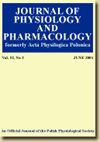The effect of microRNA-663b in the inhibition of interleukin-1-induced nucleus pulposus cell apoptosis and inflammatory response.
IF 2
4区 医学
Q3 PHYSIOLOGY
引用次数: 0
Abstract
The aim of this study was to explore the role and pathological mechanism of microRNA-663b in interleukin-1beta (IL-1β)-induced inflammation and apoptosis of nucleus pulposus cells. First, the best concentration and time to construct the nucleus pulposus cell inflammation model was screen out. Overexpression or inhibition of miR-663b expression was performed by adding microRNA-663b mimic or microRNA-663b inhibitor. 293T cells were transfected according to experimental requirements. The luciferase activity of each group was detected to analyze the targeted regulation of microRNA-663b on interleukin-1 receptor (IL1R1). Compared with the mimic negative control (NC) group, the expression of inflammatory factors in the microRNA-663b overexpression group was inhibited (P<0.05), and the expression of type 2 collagen and polysaccharide protein increased (P<0.05), and the apoptosis of nucleus pulposus cells was inhibited (P<0.01), and the number of TUNEL-positive cells decreased significantly (P<0.01), and the microRNA and protein expression of IL1R1, the ratio of P-P65/P65 and phospho-nuclear factor of kappa light polypeptide gene enhancer in B-cells inhibitor, alpha (P-IκBα)/nuclear factor of kappa light polypeptide gene enhancer in B-cells inhibitor, alpha (IκBα) protein expression were significantly decreased (P<0.05). The expression of inflammatory factors in the miR-663b inhibitor group was significantly higher than that in the inhibitor NC group (P<0.01), and the expression of type 2 collagen and polysaccharide protein was significantly decreased (P<0.01), and the number of apoptosis cells and TUNEL staining positive cells increased (p<0.01). The expression of IL1R1 gene and protein was significantly increased (P<0.01). The ratio of P-P65/P65 and P-IκBα/IκBα protein expression increased (P<0.05). IL1R1 is a downstream target gene of microRNA-663b. MicroRNA-663b may down-regulate the expression of IL1R1 at the transcriptional level by targeting IL1R1, inhibit the inflammatory response of nucleus pulposus cells, and slow down the degeneration of nucleus pulposus cells.microRNA-663b在抑制白细胞介素-1诱导的髓核细胞凋亡和炎症反应中的作用。
本研究旨在探讨microRNA-663b在白细胞介素-1β (IL-1β)诱导的髓核细胞炎症和凋亡中的作用及病理机制。首先,筛选出构建髓核细胞炎症模型的最佳浓度和时间。通过添加microRNA-663b模拟物或microRNA-663b抑制剂来过表达或抑制miR-663b的表达。按照实验要求转染293T细胞。检测各组荧光素酶活性,分析microRNA-663b对白细胞介素-1受体(IL1R1)的靶向调控。与模拟阴性对照(NC)组相比,microRNA-663b过表达组炎症因子表达受到抑制(P<0.05), 2型胶原蛋白和多糖蛋白表达增加(P<0.05),髓核细胞凋亡受到抑制(P<0.01), tunel阳性细胞数量明显减少(P<0.01), IL1R1、b细胞抑制剂P-P65/P65与κ轻多肽基因增强子磷酸化核因子比值、α (P- κ b α)与κ轻多肽基因增强子磷酸化核因子比值、α (i - κ b α)蛋白表达量均显著降低(P<0.05)。miR-663b抑制剂组炎症因子的表达明显高于抑制剂NC组(P<0.01), 2型胶原和多糖蛋白的表达明显降低(P<0.01),凋亡细胞和TUNEL染色阳性细胞数量增加(P<0.01)。IL1R1基因及蛋白表达显著升高(P<0.01)。P-P65/P65和P- κ b α/ i - κ b α蛋白表达比升高(P<0.05)。IL1R1是microRNA-663b的下游靶基因。MicroRNA-663b可能通过靶向IL1R1,在转录水平下调IL1R1的表达,抑制髓核细胞的炎症反应,减缓髓核细胞的退变。
本文章由计算机程序翻译,如有差异,请以英文原文为准。
求助全文
约1分钟内获得全文
求助全文
来源期刊
CiteScore
4.00
自引率
22.70%
发文量
0
审稿时长
6-12 weeks
期刊介绍:
Journal of Physiology and Pharmacology publishes papers which fall within the range of basic and applied physiology, pathophysiology and pharmacology. The papers should illustrate new physiological or pharmacological mechanisms at the level of the cell membrane, single cells, tissues or organs. Clinical studies, that are of fundamental importance and have a direct bearing on the pathophysiology will also be considered. Letters related to articles published in The Journal with topics of general professional interest are welcome.

 求助内容:
求助内容: 应助结果提醒方式:
应助结果提醒方式:


